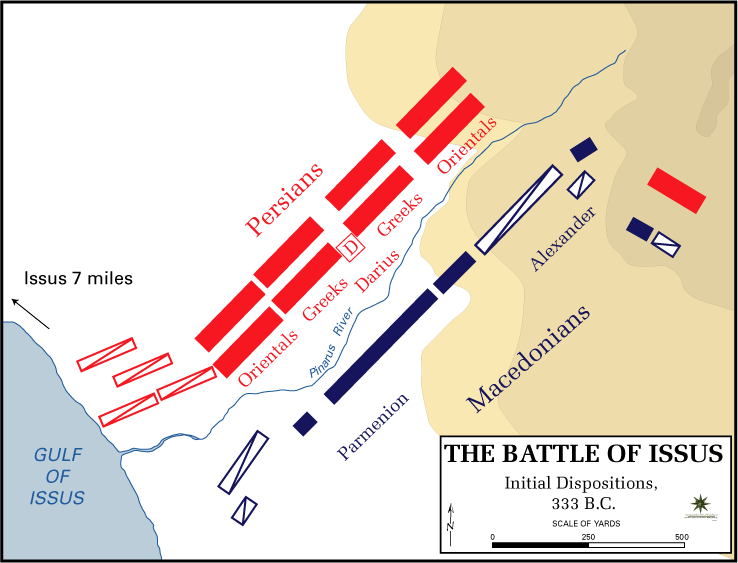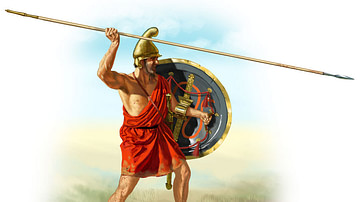
The Battle of Issus, on 5 November 333 BCE, was Alexander the Great's second battle against the Persian army and the first direct engagement with King Darius III, near the village of Issus in southern modern-day Turkey. It was a major victory for Alexander, defeating the Achaemenid Empire and causing Darius III to flee the battlefield.
Prelude
After the death of his father and his ascension to the Macedonian throne, Alexander's first order of business was to pursue his father's dream, the conquest of the Persian Empire. Using the excuse that he was seeking revenge for the invasion of Greece by Darius I and Xerxes, Alexander crossed the Hellespont into Asia Minor. As he moved southward he defeated the Persian forces at Granicus and Halicarnassus. His next major confrontation would be at Issus in November 333 BCE. This battle would be the first of two meetings between Alexander the Great and King Darius of Persia; both would end in a defeat of the Persian forces.
When Alexander learned of Darius' presence in the agricultural-rich land surrounding Issus, he quickly moved southward from Gordium through the Cilician Gates to the port town of Issus. Although the battle itself would be further south on a narrow plain between the Mediterranean Sea and the Amanus Mountains, the port served as a base camp for Alexander's forces. It was there that he left a number of wounded and sick to recover. Later, as Darius marched his troops to meet Alexander at the River Penarus, the Persian king stopped at the Greek base camp where he tortured and executed the recuperating Macedonian soldiers, cutting off the right hand of those who were allowed to live. This act would serve as a further incentive to Alexander's army to defeat the Persians.
Focusing on his rendezvous with Alexander, Darius moved north from Babylon to an area east of the Issus River. Basing her estimates on ancient sources, historian Ruth Sheppard has Darius with an estimated army of between 300,000 and 600,000 as well as 30,000 Greek mercenaries while more modern numbers are from 25,000 to 100,000 with only 10,000 Greek mercenaries. Although he considered waiting there for Alexander, Darius changed his mind hoping to separate Alexander from his base at Issus and thereby isolating him. Alexander had marched south from Issus toward Syria, but after confirming the presence of Darius at Issus, he turned back to the north. Darius moved further south into the narrow strip of land west of the Amanus, thereby placing his forces at a disadvantage. The two armies met at the River Penarus; the weather was rainy and cold. The area did, however, provide a distinct advantage for Alexander because not only did it reduce Darius's mobility but he could also spread out his own troops.
Plutarch, in his The Life of Alexander the Great, spoke of this advantage and the victory it would soon bring when he said:
Fortune was not kinder to Alexander in the choice of ground, than he was careful to improve it to his advantage. For being much inferior in numbers, so far from allowing himself to be outflanked, he stretched his right wing much further out than the left wing of his enemies, and fighting there himself in the very foremost ranks, put the barbarians to flight.

Battle
Unfortunately for Darius, he had ignored the advice of Charidamus, one of his trusted Greek generals, who had told Darius to divide his forces and allow him (Charidamus) to fight alone against Alexander. Darius ignored this suggestion for what some see as a matter of ego and prestige. He could not lose to this young Greek upstart. After being ignored, Charidamus made the mistake of a few ill-chosen comments about Persians. Darius, who spoke Greek and perfectly understood the comments, was offended and immediately had his general executed — something many consider as unwise because Charidamus was viewed at one of Darius's most capable generals.
The entire battle did not go well for Darius. Despite the advantage of numbers, he and his men were soon on the defensive, unable to maneuver as they would have liked. Darius's left flank was hampered by the river valley, mountains on his left and the sea on his right.
Alexander, on the other hand, was able to use his trusted phalanx formation. His right flank extended to the mountains and his left to the sea. He had three battalions on the right and four to the left with heavy infantry in the middle. After viewing Alexander's formation, Darius moved his cavalry to attack Alexander's right with hopes of breaking through his right flank. Although hampered by the river bank and stockades erected by Darius, Alexander and his Companion cavalry moved quickly through the Darius's left flank. Attempts to drive Alexander back across the Pinarus failed. Historian Arrian in his The Campaigns of Alexander said:
Darius' Greeks fought to thrust the Macedonians back into the water and save the day for their left wing, in their turn, with Alexander's triumph plan before their eyes, were determined to equal his success and not forfeit the proud title of invincible, hitherto universally bestowed upon them.

Alexander and his forces turned toward the Persian center where he spotted Darius. Although Darius's brother Oxathres attempted to block Alexander's charge, he failed. Darius fled the battle at first in his chariot and then on horseback. Despite a serious thigh wound, Alexander would pursue him until nightfall but returned empty-handed. Meanwhile, Alexander's left flank, under the leadership of Parmenion, was having problems with Darius's right. However, when the Persian forces saw their leader flee, they fled, too; many were trampled to death in the mass exit. In all, the Persians lost 100,000 foot soldiers and 10,000 cavalry while Alexander only lost 1,200. These numbers are, as before, Greek estimates. Modern estimates are more reasonable having Darius lose around 20,000 and Alexander 7,000. The Persians left so hurriedly that there was much plunder awaiting Alexander and his men. Plutarch said:
…Darius's tent, which was full of splendid furniture and qualities of gold and silver, they (his soldiers) reserved for Alexander himself, who, after he had put off his arms, went to bathe himself saying, 'Let us now cleanse ourselves from the toils of war in the bath of Darius.
There was more than gold and silver, however, left behind — Darius's mother, his wife, and two daughters were found in Darius's tent, but Alexander promised them that they would come to no harm. Plutarch wrote:
… (Alexander) let them know Darius was not dead, and that they need not fear any harm from Alexander, who made war upon him only for dominion; they should themselves be provided with everything they had been used to receive from Darius.
Although Darius sought the return of his family, promising Alexander half of his kingdom, Alexander refused. Instead, Alexander challenged him to stand and fight, and they would meet a second time at Gaugamela where Darius would again flee, but this time he would meet his death by one of his own — Bessus.






